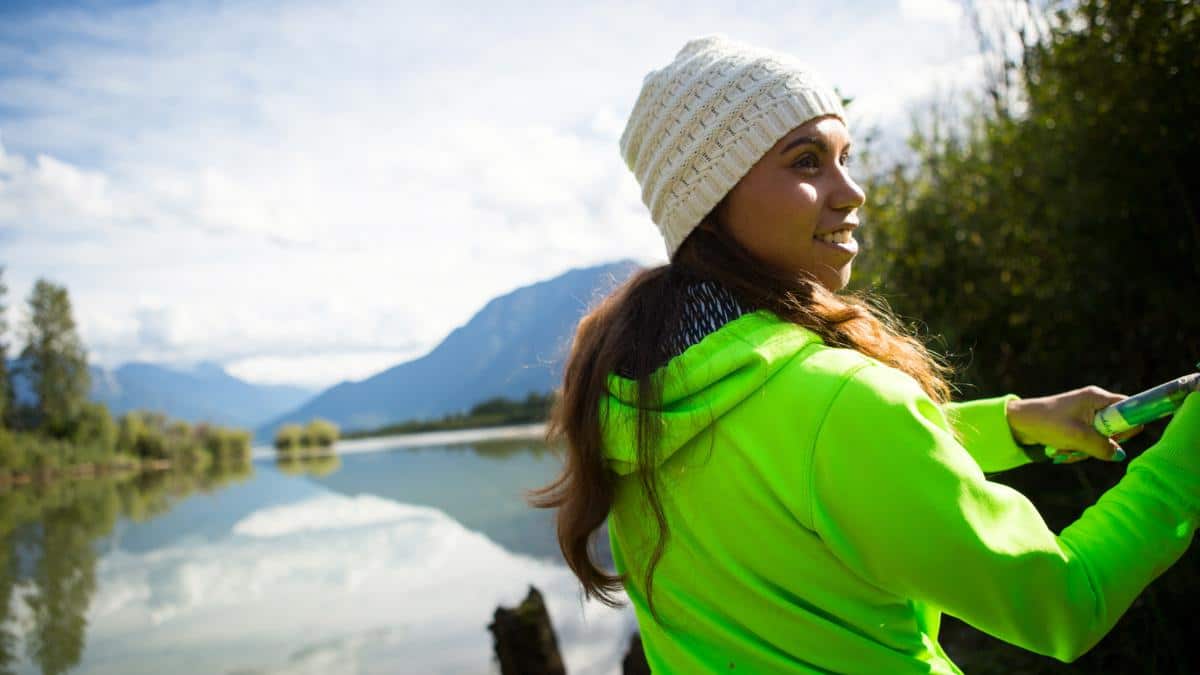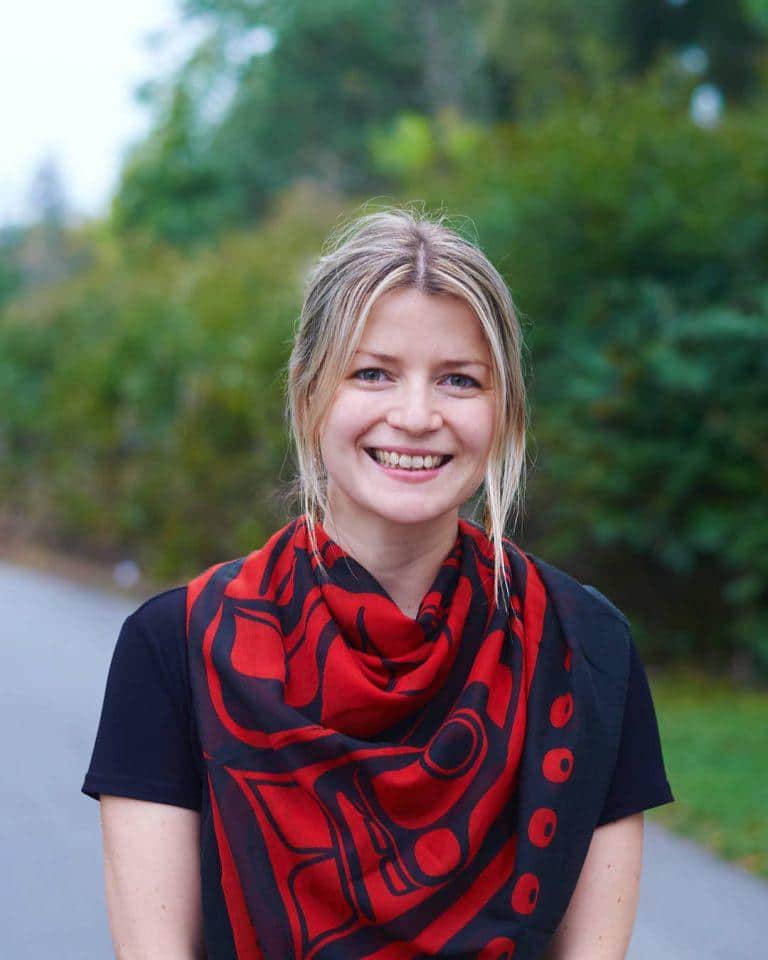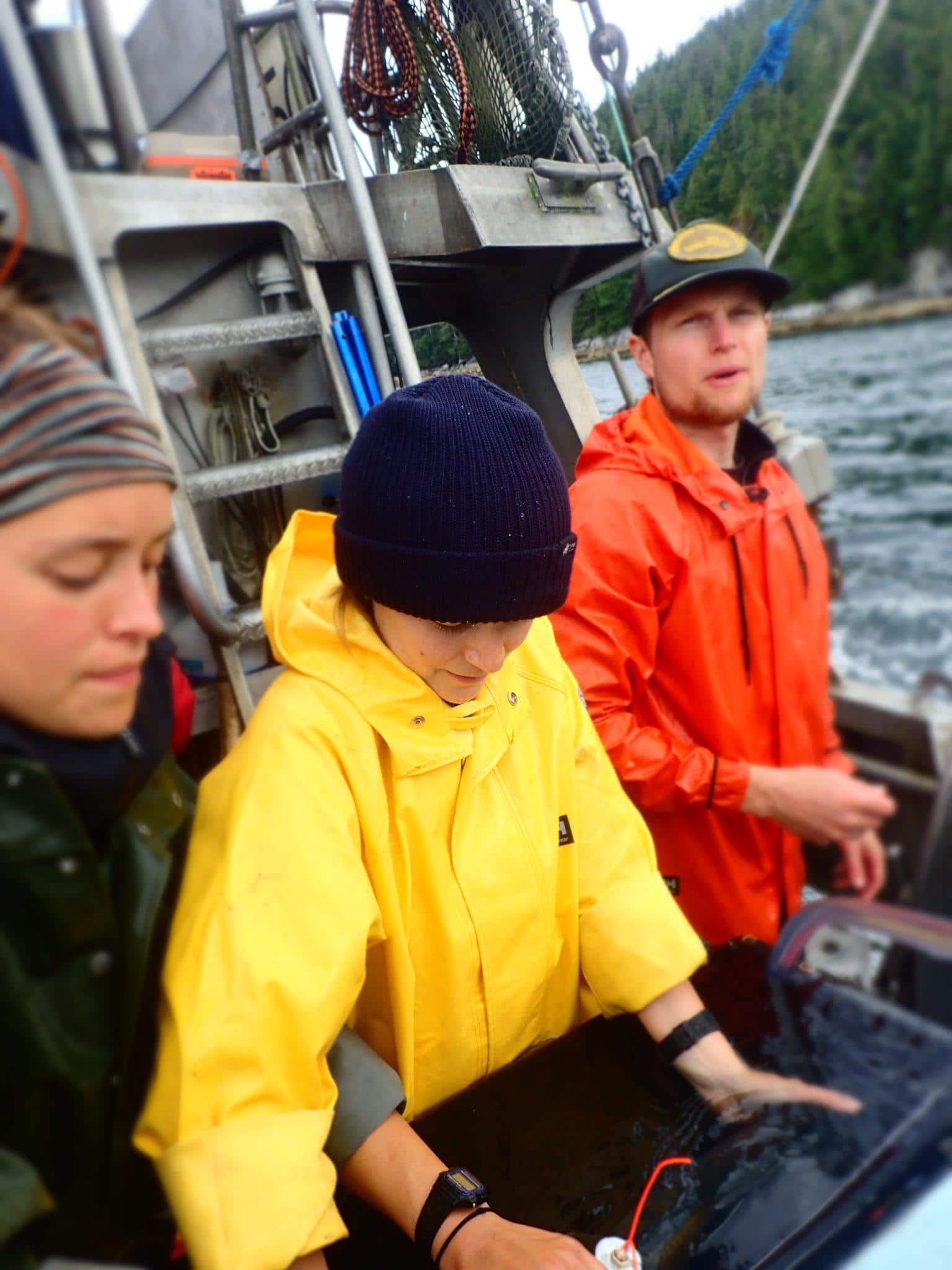

An Indigenous Canadian woman fishes for salmon in the river. nattrass / Getty Images
By Tara Lohan
Andrea Reid grew up surrounded by water on Canada’s Prince Edward Island with fish “very much just in my blood,” she says. When she went to college, she realized that fish could be a career, too.
The shape of that career began to form when she worked as a biologist on fish and fisheries in Uganda, Indonesia, the Philippines and the Solomon Islands. “I really began to see just how much fishers know,” she says. “And I started bringing that thinking home.”
Last month Reid, a citizen of the Nisga’a Nation, helped launch the Center for Indigenous Fisheries at the University of British Columbia, where she’s an assistant professor in the Institute for the Oceans and Fisheries.
The center aims to work on culturally significant fish and fisheries “through community-based approaches that put Indigenous needs, priorities and voices at the center of all our projects, research and outreach,” explains Reid, who serves as its principal investigator.
The Revelator spoke with her about how this approach to research differs from Western methods, how it can expand scientific processes and the challenges Indigenous fisheries face.
It seems like the work the center aims to do would break new ground. How do you think it could change research and the way fisheries science is conducted?
There’s nothing else that we know of that centers on community-based research and creating a space for Indigenous fisheries knowledge and methodologies in the university space in this country. We’re trying to fill a pretty critical gap.
At its core, it’s really about employing key principles of respect, responsibility, relationality, reciprocity — building those elements that are foundational to many Indigenous world views into how we move through the research process.

Andrea Reid, principal investigator at the Centre for Indigenous Fisheries. Alex Sarna
A lot of Indigenous research methodologies are deeply community centered and are trying to move us away from the model that has pervaded in Western science for a long time, which is researchers coming into communities, extracting data and using it for their own needs and purposes.
Putting Indigenous knowledge and communities at the forefront of research has the potential to change outcomes, but I think it can also change the way that we even ask questions. It certainly changes the way we go about answering them and how much difference the work actually makes. In the fisheries world there’s this slogan, “Bring fishers on board or miss the boat.” And the same applies to communities, right?
If we want to have people buying into these recommendations that we’re putting forward as scientists, we need to engage them in that process, have them understand what it is that we’re talking about and what the research is intended to achieve. If you do that, you can get a lot more buy-in and credibility in the work. It’s a whole different way of operating in many respects.
What threats do Indigenous fisheries face?
The Indigenous fisheries in which I have done a lot of my work on the Pacific Coast of Canada have been extremely long standing. They date back millennia and have really been shaped by the knowledge systems that have been passed down generation to generation.
Indigenous fisheries systems are often very well matched to the environment in which they’re set, where certain gear types or the times of year that you’re fishing or how you fish all match that environment.
There’s a great diversity in Indigenous cultures around the world so I don’t want to paint with too broad a brush, but a lot of Indigenous fisheries adhere to worldviews that center on relationality. Many see the fish as an extension of our lives. On the Pacific Coast, we identify as salmon people and we see salmon as relatives, not necessarily as commodities or resources.
That view really changes the way that one might operate in the fishery — whether you take everything that you can get your hands on, or maybe you take a small amount and leave some for the next family, the next person that comes along.
But Indigenous fisheries along the Pacific coast, but also around the world, share a lot of parallels in terms of colonial processes and their dispossession and displacement through colonization. In many cases Indigenous fishery systems have been placed in pronounced bounds where they can only operate in certain ways and under certain conditions. A lot of Indigenous fishery practices have been outlawed, banned or totally criminalized.
That’s the focus on one of your upcoming projects called “Fish Outlaws,” right?
Yes. That’s a new National Geographic Society-supported project that centers on telling stories around dispossession and criminalization, and how, in many cases, what we see here in Canada quite frequently today is that simply exercising constitutionally protected fishing rights can be deemed illegal in certain circumstances, with people getting heavy fines and even facing jail time for practicing what our constitution protects.
A big part of this project is aimed at bringing this to light to understand the histories of what we call “fish outlaws” — people who’ve been criminalized for simply participating in the fishery that has been passed down across generations and to which they have clear well-defended rights.
Where do you see the center’s work going as it develops? Will you start by focusing on Canada?

Taylor Wale, Andrea Reid and Collin Middleton on board the Ocean Virtue in 2016 where they were tagging and tracking Pacific salmon on BC’s North Coast. Katrina Cook
To begin we are focusing on British Columbia First Nations and partnering with communities and nations here. But I am also on the front end of developing a partnership in the Great Lakes of North America with nations and tribes on either side of the border looking at invasive sea lamprey.
There are also budding partnerships with fisheries in other contexts and communities. There’s a lot of parallels with Aboriginal fishers in Australia, with Māori fishers in New Zealand and native Hawaiian fishers. But again, we are focusing local and then overtime building into more of that trans-local community.
We’re starting as a small group of principally Indigenous scholars. And over time we really hope to grow what we’re doing so that this becomes a space for community members, fishers and managers — that they feel welcomed and see room for themselves in [academia, which] historically, has not been very kind to underrepresented groups. And there are not many Indigenous students in post-secondary education. There’s not many Indigenous students typically in science.
And so I hope that the creation of the Center for Indigenous Fisheries doesn’t ask students to leave part of themselves at the door or to depart from their worldview in order to gain access. But that instead it creates a space for them and that over time it can really help to build strong partnerships with communities and grow beyond the confines of the university.
There is a Mi’kmaw teaching called Etuaptmumk or “two-eyed seeing.” And it’s carried by a specific elder currently, Dr. Albert Marshall, who’s doing a lot of work to bring it forward into the literature but also into public spaces as well.
It’s defined as learning to see from one eye with the strengths of Indigenous knowledge and ways of knowing, and from the other eye with the strengths of Western dominant or mainstream knowledge and ways of knowing. And learning to use both these eyes together for the benefit of all.
In our fisheries and in biodiversity at large, we’re facing so many big crises where we need all of the tools that are available at our disposal. And those can equally come from Indigenous knowledge systems as well as Western scientific ones. So it’s really about bringing together the best tools for the job.
Tara Lohan is deputy editor of The Revelator and has worked for more than a decade as a digital editor and environmental journalist focused on the intersections of energy, water and climate. Her work has been published by The Nation, American Prospect, High Country News, Grist, Pacific Standard and others. She is the editor of two books on the global water crisis.
Reposted with permission from The Revelator.
- The Future of U.S. Fisheries: An Ecosystem-Based Approach ...
- 9 of the Dirtiest U.S. Fisheries Exposed - EcoWatch
- Japanese Fisheries Collapsed Due to Pesticides, New Research ...
- Indigenous Languages Are Going Extinct and Taking Knowledge of Medicinal Plants With Them
- Dispossession, Forced Relocation Left Indigenous People to Suffer Ravages of Climate Crisis, Study Confirms - EcoWatch

 233k
233k  41k
41k  Subscribe
Subscribe 